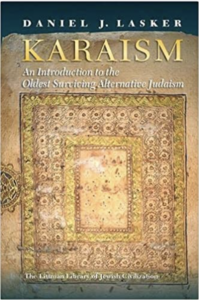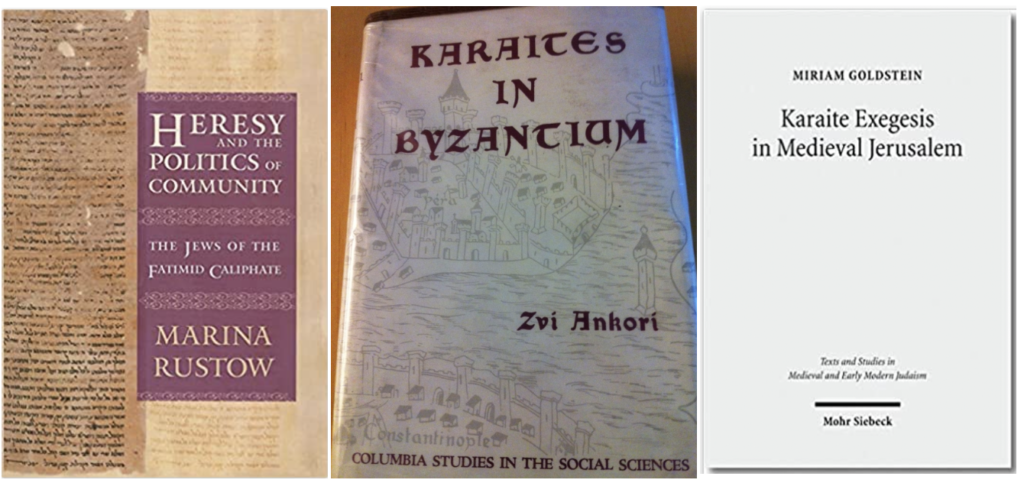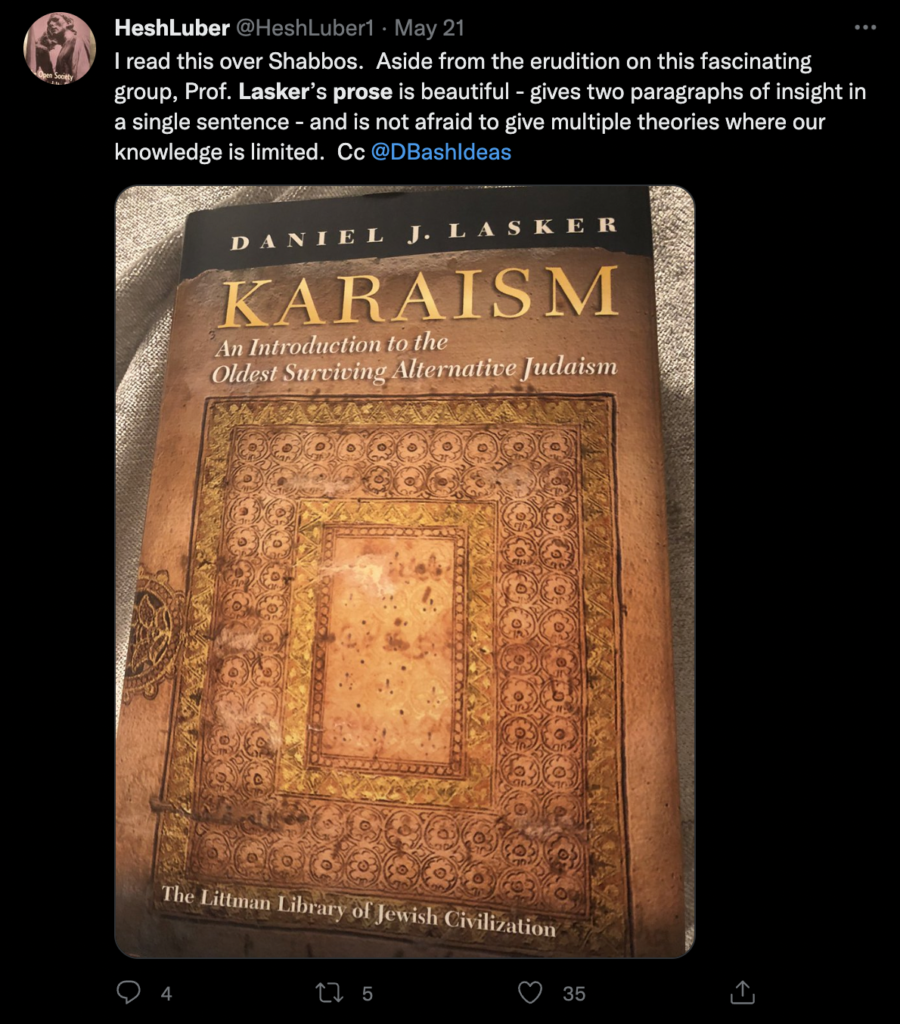I love this book. It is a perfect overview and amazing introduction to Karaite Judaism. Even I – who has been studying Karaite Judaism formally for 20+ years (and informally my entire life) – learned a tremendous amount from this book. After the jump, you can watch my video review of the book, and you can also vote on which book I do a video review of next. I’ll also describe more parts of the book that I absolutely love – and one part that I absolutely disagree with.
First, if you do nothing else today, check out my video review.
Now if you want more video reviews, let me know which book you’d like me to do next:
Before I get to more of my thoughts, I wanted to show you what someone else has said – and I echo the sentiment regarding the prose:
Okay, now for the parts of the book I liked that didn’t make my review.
- Karaites and the Dead Sea Scrolls: I agree with the tweet above – Lasker is not afraid to give multiple theories where our knowledge is limited. One spectacular example of presenting multiple theories is the relationship between Karaism and the Dead Sea Scrolls. For background, there is significant similarity between medieval Karaite theology and the Dead Sea Scrolls. But there is no consensus as to why there are such similarities. Lasker puts forth 4 possibilities and says simply – we don’t know. If you want to read about these four possibilities, buy the book and check out pages 23-4.
- Karaites in Byzantium and Beyond: The section on Karaites in Byzantium spoke to me on many levels. First, one of the most popular (and beautiful, if I may comment on my own work) posts I ever did was on the Karaite community in Byzantium. Second, Lasker provides an overview of the most important personalities of the Karaite movement in Byzantium. He talks about Judah Hadassi, whom we cited in the appendix our edition of Royal Attire. Lasker discusses Aaron ben Joseph, the person who set the Karaite liturgy in its current form. The Karaite Press actually has an amazing book coming out about the poetry of Aaron ben Joseph. (More details in the future.) Lasker also talks about the last great Karaite bible commentator, Aaron ben Elijah, the author of Keter Torah – the most read commentary in the Karaite community today. The Karaite Press is also putting out a translation of Keter Torah’s commentary on Deuteronomy (perhaps next year!). (More details to follow.) The point is that Lasker provides overviews of the most important Karaites of the Byzantine period – and we are all better off for it.
- Karaites in Eastern Europe: Lasker crushes it in his discussion of Karaites in Eastern Europe. In about 15 pages he lays the foundation for people to learn a ton about the Karaite community in Eastern Europe. In particular, I love how he describes that there was a “non-rabbinic” group of Jews near the Black Sea in the late 12th century – and then acknowledges there is no proof that this community was Karaite. (The implications of a potentially different non-rabbinic movement out there is fascinating.) Lasker tracks various theological developments of the Eastern European Karaite Community, such as the adoption of Kabbalah among many of its members, and also discusses various sociological developments, such as the concerted effort by Karaites to distance themselves from the Jewish community. SPOILER ALERT: There are two books coming out by The Karaite Press that focuses on Karaites in Eastern Europe. The first book, copies of which are currently on a ship to the United States is called “The Crimean Karaite Communities: History, Culture, and Leadership through the the Early Twentieth Century”, by Golda Akhiezer. (My guess is that we will promote this right after the period of mourning for the Temple.) And the other book is about the shabbat songs of Karaites from the Polish-Lithuanian Commonwealth. (We’ll publish that in 2023.) BUT AGAIN, the most important thing to note is how Lasker leaves you both enriched for having read his section and excited to learn more.
- Karaite Theology: The section that I learned the most from was the section on Karaite theology (Chapter 8). This covers various theological trends amongst Karaites – and really explains how Karaite theology evolved over time and in various places. (NOTE: Rabbanite theology also evolved.) I was super excited to see a section on the Kalam (a form of Islamic theology) and its impact on Karaites and Rabbanites. Reading this section helped me understand why various Karaite sages had the views they did. I also love Lasker’s transition into later Byzantine Karaite philosophy and his description of Aaron ben Elijah’s Ets Hayim (a philosophical treatise, written by the author of Keter Torah). As Lasker writes: “Thus, Ets Hayim should be read as a reflection of the struggle between quite a number of philosophical trends, in which the Maimonidean one often emerged triumphant.” As you can see here, Lasker does an amazing job of summarizing and contextualizing various Karaite trends.
Okay – now the part that I really disagree with. And I’m nitpicking here, but on page 220, in his description of various persons of interest (“Dramatis Personae”), Lasker writes the following about Nissi ben Noah: “(late twelfth century) Karaite advocate of accepting rabbinic sources as legitimate; associated with the claim that most of rabbinic literature ‘is the work of our fathers‘.” I disagree with Lasker that Nissi ben Noah advocated that most of Rabbinic literature is the work of [Karaite?] predecessors. In my opinion, this statement is attributed to Aaron ben Joseph, a later Karaite. I asked professor Lasker about his conclusion here, and, true to form, he responded right away with his reasoning. I’m just not convinced. I really think that this sentiment is that of Aaron ben Joseph and not Nissi. This is important for a whole bunch of reasons that are not relevant for the purposes of this review.
As I mentioned in my video review there are other things that I could nitpick or quibble with, but if this is the only one that I think it is worth committing to writing, you can see how much I LOVED this book. And I recommend that you buy it.
I recommend you buy the book for two reasons. First, it is a great book and you will learn a ton. Second, it is important to show publishers that we value books on Karaism that are affordable.





Have not yet completed the read on Laskers book, so I did not read your review yet, due to the spoiler alerts. Still have a couple of chapters to go.
I would like to read Miriam Goldstein’s Karaite Exegesis in Medieval Jerusalem next and hear your review on her work.
Also Shawn, is the last of the 3 sessions of the Karaite course available for viewing? I missed it and would also like to know how to get my free copy of the book you offered the participants. You have my address from the Karaite Press orders, please have it sent to it.
Thank you!
I concur with Shawn regarding the ease of reading Lasker’s book, especially after wadding, diligently, through Astren’s “Karaite Judaism and Historical Understanding.” Both of these books should be read and digested prior to most of the Karaite Press Books. They will give a person who is considering changing their path from Rabbinism to Karaism a clearer understanding of their journey. Then read “The Karaite Jews of Egypt” by El-Kodsi. Many of the people in these two books are either still alive or are descendants of the last Egyptian Karaites. ALL of the Karaite Press books will bring Karaism to life. I am very excited to get the forthcoming book on Eastern European Karaites — especially the Ukraine as my family has a 200 year history there. Most importantly, anyone thinking to committing to Karaism must be ready to accept its differences and want to breath life back into the Karaite traditions.
Thank you for the review, Shawn!
I’m looking foward this new book of Karaite Press!!